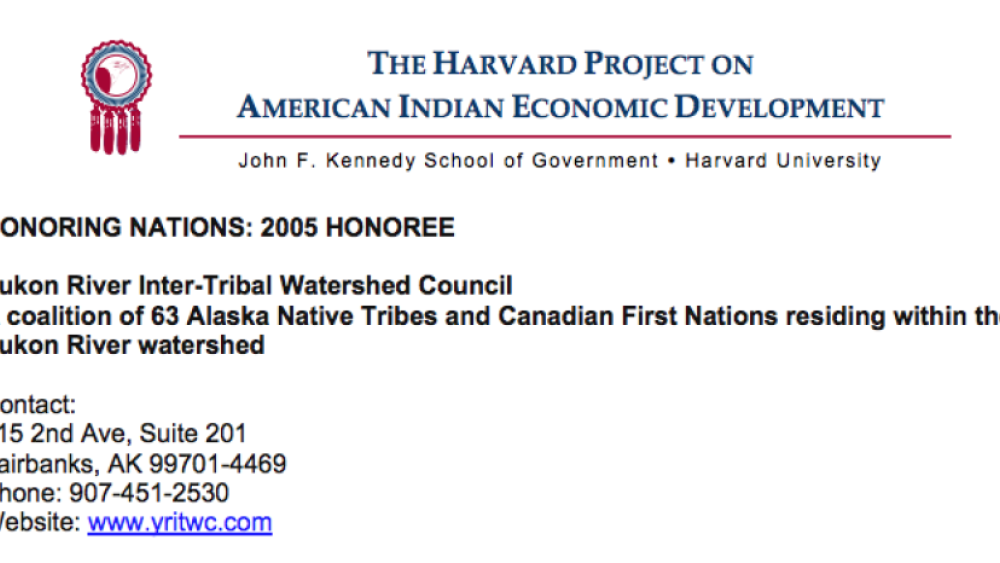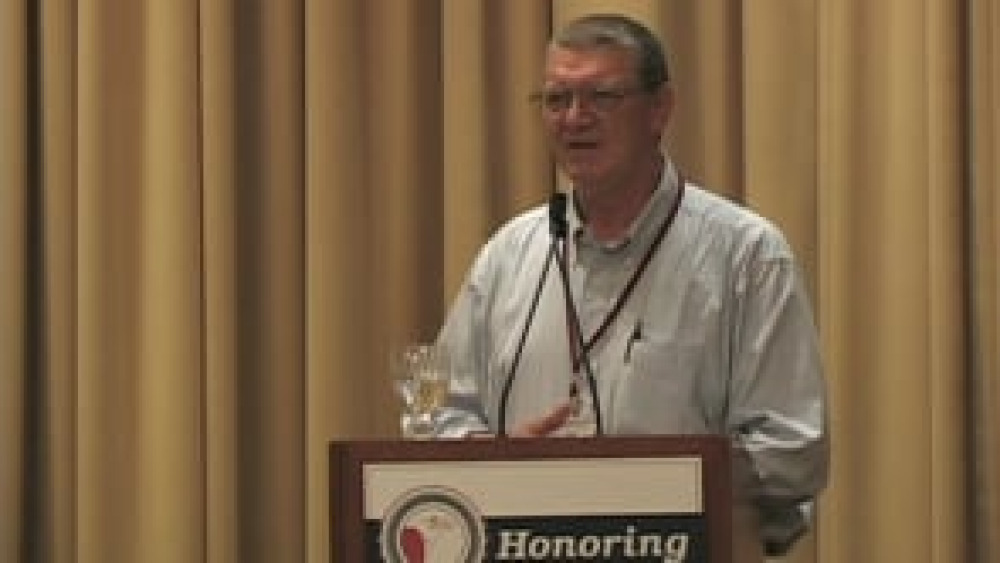Representatives of the Yukon River Inter-Tribal Watershed Council present an overview of the Council's work to the Honoring Nations Board of Governors in conjunction with the 2005 Honoring Nations Awards.
Additional Information
Alexander, Clarence, Peter Captain, Sr., James Landlord, and Pat Sweetsir. "The Yukon River Inter-Tribal Watershed Council." Honoring Nations award ceremony. Harvard Project on American Indian Economic Development, John F. Kennedy School of Government, Harvard University. Tulsa, Oklahoma. November 1, 2005. Presentation.
Transcript
Peter Captain, Sr.:
"As I said, my name is Peter Captain, Sr. I'm the first chief of Louden Tribal Council, one of the members of the Yukon River Inter Tribal Watershed [Council]. We have a huge watershed as you can see and it takes a lot of work to run this watershed. Our area is basically twice as big as California. I don't mean to put California down but that's just the way it is. Its entirety is 2300 miles long from the headwaters to the mouth where it empties into the Bering Sea. We had the largest inland run of salmon in the world on a river. And one of the statistics is that 11 percent of all the nation's tribes rely on the Yukon River for survival. We have at this time 62 Indigenous governments that have signed an accord to work with each other to help run this Yukon River Inter Tribal Watershed. Our philosophy is based on tribal sovereignty, mutual recognition and our common goal is clean water for future generations. I will now turn it over to James Landlord, Chief James Landlord for further explanation."
James Landlord:
"Thank you, Peter. So as Peter said, my name is Chief James Landlord and I'm from Mountain Village, Alaska. It's way toward by the Bering Sea at the mouth of the Yukon River. At the time, after 1997 our first summit, the...we called all the [unintelligible] board, board members and they elected steering committee to set forth the foundation of our organization. At the time we were developing them they wanted the steering committee, mentioned how do we want our, how should our organization look like or behave and after awhile one of them said, 'How about an elder?' So some guiding principles were mentioned and we went through brainstorming and some of these...we tried to describe the elder and some of these are listening, we will hear and allow for diversity, be respectful, be flexible, have integrity, be honest, timely decisions and responses, not judgmental, sharing wisdom, consensual, unifying. We use circles at our summit. Everybody gets to speak out. Be inclusive, fair and equal, tenacious, be trustworthy, patient and be bold. In the past because of our...some differences up the river when I was growing up, our relatives used to say, they call them [Native language], be careful of, they were describing our...the people up river, the Athabascan Indians, they said that they can bow and arrow you and that's how we grew up. So we had some real differences in our culture but through the summit everybody gets to speak. Thank you."
[applause]
Pat Sweetsir:
"My name is Pat Sweetsir. I'm the Tribal Administrator for the Ruby Tribe and not the Louden Tribe, although I did work for the Louden Tribe at one time, but my job is assisting the chiefs to empower their people and tribes and that's what I work hard at. We began to address the watershed and the cleanup of the watershed by talking to individuals and community leadership. And one of our distinguished leaders, Sidney Huntington, told a military general of the State of Alaska, of all the military in Alaska, that the war wasn't over until they cleaned up our backyard because the military is major contaminants of the Yukon River. With the military we went to them and said to leave your lawyers at home -- no offense to lawyers, mind you -- but leave your lawyers at home because in the end the courts would say, 'Military, clean up your mess.' And we convinced them that it would be better to spend the money on doing that cleanup and they did. With the help of EPA and other foundations we were able to bring all the tribes together and let them tell of their ecological knowledges of what was happening to the river and what was happening to their food sources. And that's how we got started to develop an accord to bring the tribes together to address the cleanliness of the river. We decided to do things in a nonthreatening manner and as Chief Landlord...we adopted some principles, which to communicate openly and honestly. And that set the groundwork for how we do business with others, with institutions, with mining companies, with the military and all. One thing that the watershed has been able to do is to help and empower tribes with successful programs to assist to develop good stewardship for the watershed. We do water quality monitoring; bring in environmental education to our schools, to our communities. It's kind of pretty cool because it's hard to get adults to change their ways but through the children it was pretty easy because we brought it to the schools and the kids say, 'Grandpa, don't throw that Coke can in the water,' and so that worked out really well. We do other things like developing pilot energy projects, performing analysis, doing solid waste and sewage system improvement programs, mapping and others. I'll turn it over to Chief Clarence Alexander."
Clarence Alexander:
"My name's Clarence Alexander. Years ago as we were...I grew up right along the Yukon River and I still live there. I used to drink the water but I don't do that anymore. One of the things that was happening in our country was that all along the Yukon River we have quite a few villages and they have health problems and we also noticed that the animals, the birds, the fish were also sick. If you're living in a country like ours right now, we're kind of lucky ones because we still maintain our traditional way of life and when you see people turning sick, all the animals and everything else, then you know that something is wrong. So we went out and...well, some of our friends from...we didn't know each other to start off with, first of all. We don't know each other at all. I'm a Gwich'in, I didn't under...I don't know the headwaters, I didn't know the middle river and the lower end of the Yukon. We had been territorial enemies for a long time and now we're friends that are fighting together instead of fighting each other. So what we set out to do is to see if we can be able to do exactly the way that our grandparents used to work and that's starting out by sitting at the campfire for days at a time. We did not have any phones; we did not have any kind of means of communicating with the outside world when we're strategizing as to how we can implement our clean water...to create clean water. And a vision was about 50 years that we should be able to drink that water. That's...the health, we're talking about the health in any shape, form or that you can understand. There's different ways of looking at health and ours is that we have to maintain our ecosystem where all the stuff that are coming into our country is toxic. We have so much toxic material coming into our country. [I'm told to stop.] Thank you."
[applause]
Amy Besaw:
"Thank you all very much and now we'll have a quick question and answer session with our board of governors."
Oren Lyons:
"The Yukon River Intertribal Watershed Council is treaty based and can you explain how treaties give leverage and establish your presence and authority in discussions with federal agencies, townships and corporations?"
Pat Sweetsir:
"The treaty...a treaty acquired that was signed by all the tribes by consensus and that gives us the authority to act with the tribes to interface with institutions and federal and state type of agencies."
Brian C. McK. Henderson:
"I have another question if I may. Have you had a situation where there's been a violation by some entity or authority in breaching certain accords or agreements with regard to the river and if so, what have you done to enforce the agreements and have you had any problems in doing so?"
Pat Sweetsir:
"We interface with the people that are violating with open communication. We haven't had to do any kind of court kind of things yet but then we're young and we know that those problems are ahead of us, that there are many polluters that we haven't even addressed yet along some of the tributaries that feed into the main watershed, particularly the Talon River."


